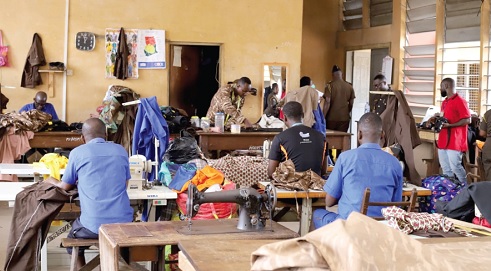Equipping prison inmates with entrepreneurial skills while they serve their sentences in safe custody is a vital prerequisite for rehabilitation and for building a resilient nation.
Rehabilitation, however, seeks to re-establish the character and reputation of the offender through careful planning, structured programmes, and deliberate efforts aimed at restoring the individual to a socially acceptable condition.
Importantly, this approach is grounded in the principle of accepting the prisoner as an active participant in learning and interaction within their environment.
It requires both personal and collective efforts to provide opportunities for developing social and technical skills, thereby preventing idleness and mental frustration, and ultimately restoring the individual’s appropriate social capacity.
From a broader perspective, the Ghana Prisons Service has, over the years, contributed to the rehabilitation of inmates by equipping them with diverse skills that have enabled many to become successful entrepreneurs.
It is, therefore, important to note that providing essential skills training to inmates significantly contributes to building a law-abiding and peaceful society, and by extension, a stronger nation.
Undoubtedly, for a nation’s workforce to thrive and for its economy to remain buoyant, there is a need to invest in the human resource potential of its youthful population.
On the flip side, the more than 40 prison establishments in Ghana are making significant investments in equipping inmates with entrepreneurial skills, as part of the Service’s mandate to reform them into productive citizens upon their discharge.
Rehabilitation
The operations of the Ghana Prisons Service play an important role in shaping the lives and future of over 13,000 inmates—many of whom are part of the nation’s youthful workforce—by providing them with employable skills while they serve their sentences.
The institution, renowned for its exceptional role in the criminal justice system, remains steadfast in its efforts to provide the best service possible, recognising that the prison is not merely a place of punishment but also a haven of hope through rehabilitation and reformation.
Over the years, the Service has pursued this mandate by training prisoners in vocational and trade skills such as carpentry, farming, masonry, electrical works, weaving, draughtsmanship, ceramics, shoemaking, tailoring, among other viable economic activities, to equip inmates to become self-sufficient upon their reintegration into society.
In some camp prisons, inmates are trained in modern techniques and practices in agriculture, including crop farming, poultry, and livestock rearing.
As a beacon of hope, rehabilitation offers inmates alternative opportunities, helping them realise that there are better ways of living than resorting to criminal activities for income.
The Service recognises that entrepreneurship is a catalyst for economic growth, job creation, and social transformation.
By prioritising inmates’ welfare, it seeks to set them on the right path and discourage re-offending.
Although some friends and families may feel disheartened knowing that their loved ones are spending their productive years in prison, the hope remains that they will return upon discharge as skilled entrepreneurs.
It is noteworthy that when inmates are equipped with employable skills, they unlock their innovative potential and are better prepared for the job market, making their reintegration into society as productive citizens much easier.
Rehabilitation, function
It is prudent to note that rehabilitation is a core mandate of the Ghana Prisons Service in the management of Prisons.
According to Section 1, Subsection (i) of the Prisons Service Decree, NRCD 46 of 1972, the Prisons Service is mandated to ensure the safe custody and welfare of prisoners and, whenever practicable, to undertake their reformation and rehabilitation.
This implies that the Prisons Service is mandated to perform four major functions: the safe custody of prisoners, the welfare of prisoners, their reformation, and their rehabilitation.
Efforts
Under the able leadership of its Director-General, Mrs. Patience Baffoe-Bonnie, Esq., the Ghana Prisons Service has consistently implemented measures and created an enabling environment to help inmates become self-sufficient after serving their sentences.
With a staunch commitment to transformative programmes, the Service has created opportunities for inmates to rebuild their lives through diverse skills training.
These range from agricultural production, fish farming, soap and detergent making, and juice processing and packaging, to bamboo bag crafting, shoemaking, and several other innovative products made by inmates.
To maximise the impact of existing training programmes supported by the government, these initiatives would thrive if they received a significant boost through strong partnerships and support from corporate entities, benevolent donors, and other organisations.
Notwithstanding, the goods and services produced by inmates under the guidance of their training officers are truly remarkable.
The writer is an Assistant Superintendent of Prisons,
Public Relations Personnel,
Stationed at Senior Correctional Centre, Accra.

